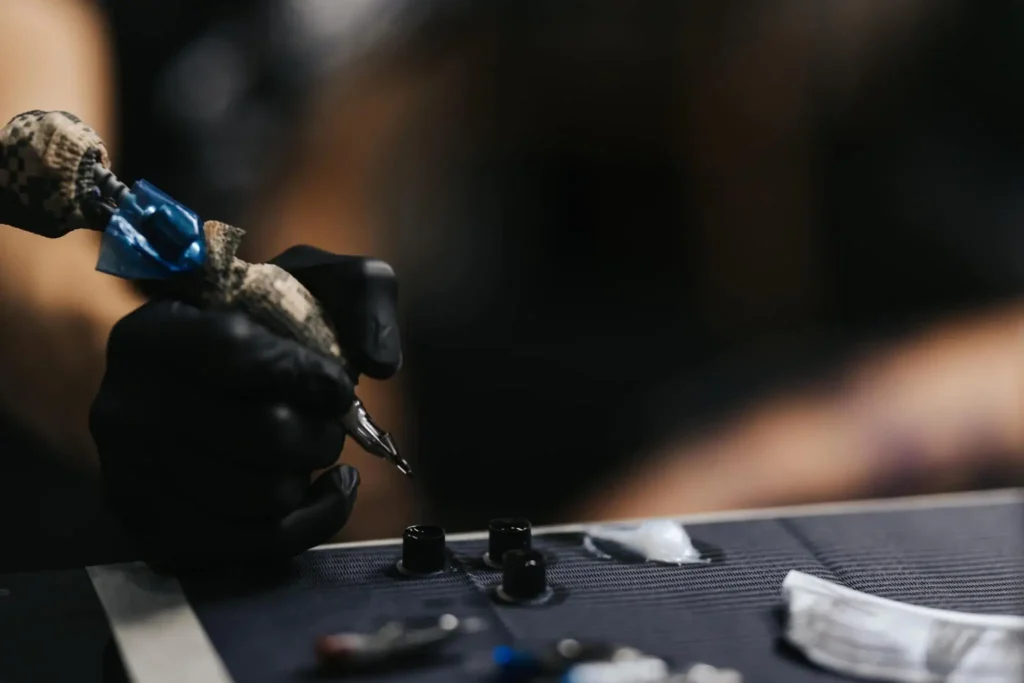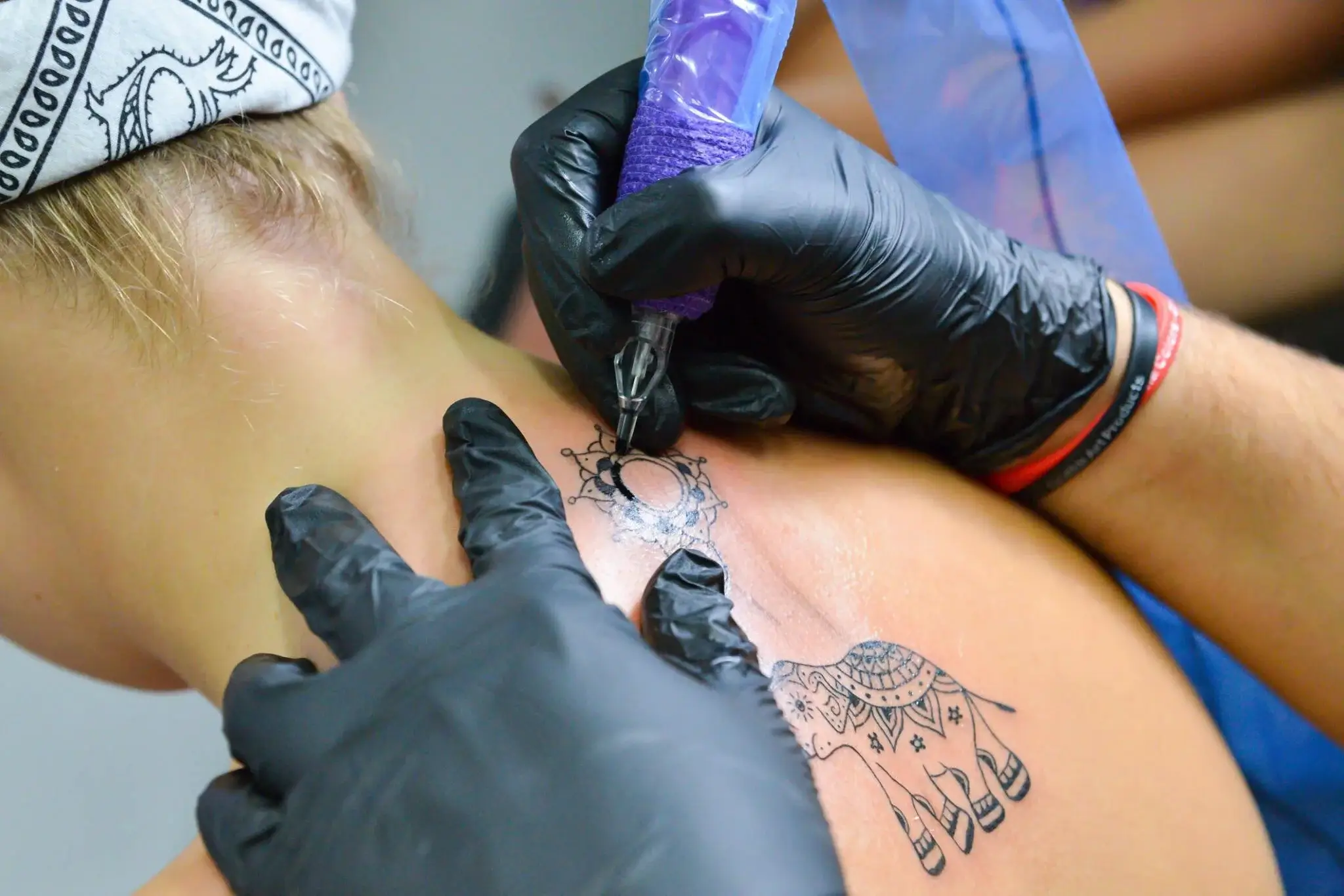In an advanced world, many tattoo lovers are turning to strange ways of healing and self-expression. Ink wearers often claim that tattoos are therapy in some form. After reading this line of tattoo facts, you will be shocked: the needle of the tattoo machine injects your skin 50 to 3000 times in one minute. This is quite painful, and you need to be patient. I suggest you use tattoo numbing sprays as it reduces the pain. Those who claim the pain is therapeutic may seem like members of an exclusive club. Some anecdotal and scientific studies have recommended that tattoos help you become stronger.
A very famous method that is mostly used and its famous and common choice is “Tattoo Therapy.” Ink therapy explores the deeper psychological and emotional benefits that tattoos provide, as opposed to the traditional view that tattoos are merely body art. Now, let’s look at how tattoos can be a therapeutic tool and how they can be used as a form of therapy.
What Is Tattoo Ink Therapy?
Tattoo therapy is a great strategy. To heal that, getting tattooed is used to encourage mental well-being. Focus is on more than just cosmetics regarding body ink; it also considers mental and emotional aspects.
Background History: Using the idea of tattoos for therapeutic purposes is familiar to everyone. For the rest of history, different cultures have included tattoos in healing rituals and spiritual practices. The symbolic meaning and transformational power have attracted ancient civilizations and modern societies alike.
How Tattoos Can Be Therapeutic
Everyone thinks tattoos have the power to enable psychological healing and emotional growth in different ways:

1. Psychological Effects
In particular, people who have experienced trauma or adversity may find tattooing to be an empowering and controlling experience. In this process, different factors are involved, like facing the needle, choosing a design, and enduring the pain, which can instil a feeling of courage and resilience.
2. Emotional Healing
Tattoos work as a catharsis for lots of people. It allows you to express your memories and emotions that are tough to communicate verbally. People use jewellery for numerous reasons, including honouring friends and family, commemorating significant life events, or symbolizing personal growth.
3. Self-Expression And Identity
In my view, tattoos undoubtedly provide an excellent medium for unique self-expression, allowing them to visually communicate their values, beliefs, and identity to the world. Preferably, this storytelling facilitates connection and belonging across borders rather than being bound by language barriers.
The Science Behind Tattoo Ink Therapy
Even though tattoos have subjective psychological advantages, there is scientific evidence that recommends they can have therapeutic advantages.
Endorphin Release
You know, the process of getting tattooed triggers the release of endorphins, which are natural painkillers that induce feelings of relaxation and euphoria. This natural high can reduce stress and boost health during and after tattooing. If you are a beginner, then it’s really helpful for you.
Mindfulness and Pain Distraction
You need to think positively and feel good that it shifts your focus from the pain. With the help of that same way its mindfulness practices induce meditative states, intensive tattooing can induce a meditative state. Pain distraction and emotional regulation can be achieved with tattoos by diverting attention away from negative thoughts and sensations.
Symbolic Meaning and Cognitive Therapy
Most people believe that tattoos have strong psychological effects because of the Symbolism they contain. They work as visual reminders of one’s values, goals, and aspirations. These cognitive therapy guidelines help people reframe their experiences and create new narratives that empower and motivate them.
Is Tattoo Therapy a Real Thing?
The popularity of tattoo therapy is growing day by day, but some doubtful people are raising the question of tattoo therapy’s legitimacy. Clinical observations and empirical evidence demonstrate its efficacy, however, in psychology, counseling, and holistic healing. I recommend you check these articles to get more information about tattoos.
Discovering The Meaning of Ink Therapy
The similarities of tattoo therapy are much the same as art therapy. The objective of this well-maintained form of psychotherapy is to increase self-awareness and dynamic healing through innovative presentations. Artists present and represent symbolic information in ways that can be therapeutic for patients from both viewpoints, however.
Advantages of Ink Therapy
A number of aspects of private development are influenced by ink therapy beyond emotional healing:
Stress Reduction
As we all know, tattoos can work as stress-reducing outlets, providing a fleeting escape from life’s pressures and responsibilities. Getting tattooed can be considered a form of self-care and pampering, promoting relaxation and rejuvenation. So it’s really helpful, and it’s a great addition to your personality that enhances you.
Building Confidence
In addition to providing empowerment and body positivity for people with body image or low self-esteem issues, tattoos can also provide a calming effect. Self-confidence and self-acceptance are encouraged by feeling like one is in control of your body. Also, it boosts your confidence and helps you look cool and fresh.
Overcoming Trauma
For people who have traumas, tattoos can offer help in the healing process for survivors of trauma by offering a palpable symbol of stability and survival. Accordingly, they allow individuals to regain their narrative and move forward with renewed purpose while serving as permanent reminders of their strength and courage. Also, during tattoo removal, does it leave scars? Lots of people ask these questions.
Considerations and Protection
While tattoo therapy provides you with lots of advantages, it’s necessary to achieve it mindfully and responsibly:
Choosing the Right Design
You can choose a tattoo design that maintains private meaning and importance and is important for maximizing its therapeutic possibility. You need to focus on the planned symbolism and make sure it aligns with your goals and values. I recommend that when you choose the tattoo design, be careful and also discuss it with the tattoo artist.
Finding a Qualified Artist
It would help if you contacted a trusted and skilled tattoo artist. The success of therapy is quite an essential step for the success of therapy. You can have kindness and expertise guided through the tattooing process by a professional who understands the therapeutic aspect. So I suggest before you’re in therapy, you just need to find a skillful and expert tattoo artist.
Managing Expectations
That is important for you. My point of view is that to be effective in Ink therapy, the patient must have realistic expectations. Despite tattoos’ transformative power, they cannot solve all emotional or psychological issues. Their importance as part of a holistic self-care and healing approach cannot be exaggerated.
Addressing Common Concerns and Misconceptions
Pain and Perseverance
Everyone knows that fear of tattoo pain is a common concern for those who focus on tattoo therapy. Despite the pain that tattooing can cause, the pain is temporary and manageable, and for many people, it serves as a cathartic and empowering experience. I recommend a tattoo numbing spray if you want a painless tattoo.
Social Stigma
Few people are concerned about society’s judgments and perceptions regarding tattoos. Now tattoos have become more famous, attitudes about them are evolving, and they are increasingly seen as legitimate expressions of self-expression. To protect your tattoos from fading, you must follow proper aftercare instructions.
Tattoo Regret
In addition to regretting a tattoo, many people are afraid of getting one. After reading this, we all know that tattoo therapy can be an important and rewarding experience; it should be carefully considered and thoughtfully planned before going through with it.
Final Thoughts
My final words for ink therapy: ink therapy is a unique and powerful way of healing and discovering oneself. With the help of this, you can also enhance self-discovery, empowerment, and healing; tattoos can also improve your self-esteem. A tattoo therapy session can transform a person’s life, regardless of whether that transformation is overcoming trauma, finding solace in art, or simply finding solace in self-expression.
FAQs About Ink Therapy
Is tattoo therapy suitable for everyone?
Moreover, healing emotions and tattoo therapy can benefit people seeking self-expression. Before beginning this process, one must consider personal preferences and sensitivities.
Are there any risks associated with tattoo therapy?
The cause of tattoo therapy can result in infection, allergic reactions, and dissatisfaction with the end result, just like any other form of body modification. So it’s important to research and consult with a qualified professional before proceeding.
How long does the therapeutic effect of a tattoo last?
There are a wide range of therapeutic advantages associated with tattoos. Many depend on the circumstances of the individual as well as the importance of the design. Few people may experience long-lasting emotional healing, while others may find fleeting relief from stress and anxiety.
Can tattoo therapy replace traditional forms of therapy?
The use of tattoo therapy should be seen as complementary to, rather than as a replacement for, traditional forms of therapy. When combined into a holistic approach to well-being, tattoos are most effective in facilitating emotional healing and self-expression.
Are there specific designs or motifs that are more therapeutic than others?
Tattoo designs have a highly subjective and personal therapeutic value. It is most important to consider the individual’s importance and symbolism. Eventually, the importance lies in personal connection, whether it’s a meaningful quote, a symbol of resilience, or a tribute to a loved one.

17 thoughts on “Ink Therapy: How Tattoos Can Be Therapeutic”